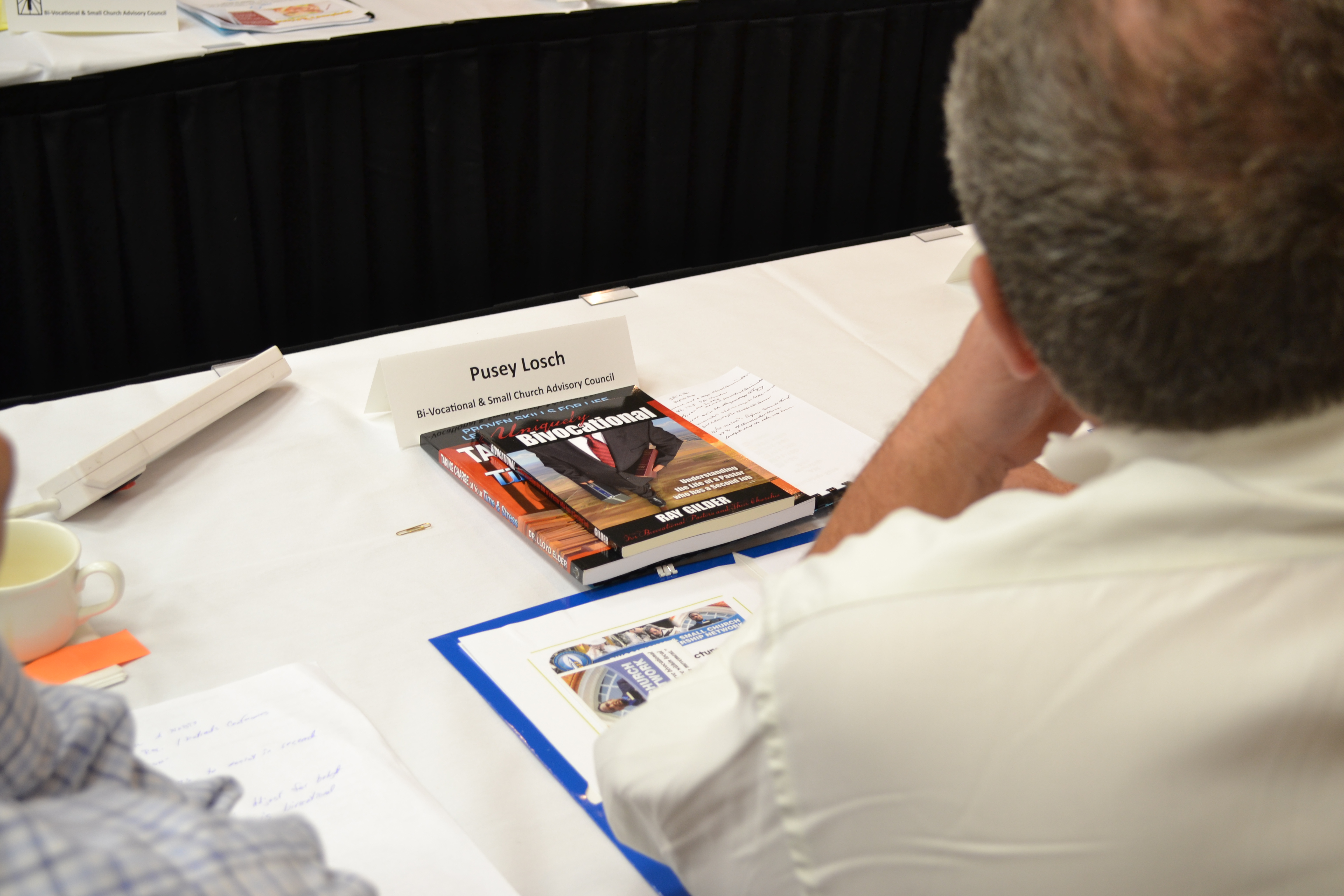
ATLANTA (BP) — They are all full-time pastors, but many of them are also farmers, public school teachers, salesmen, engineers, construction workers, butchers, agricultural consultants and business owners.
They may drive hours to reach their pastorate, but many of them expressed joy in service. They described themselves as “intentional,” with at least one pastor saying he sold items on eBay for income.
 As the 21 members of the Bivocational and Small Church Advisory Council introduced themselves at their first meeting in Atlanta Sept. 11-12, it became apparent that their occupations were as diverse as their ethnicities — including Anglo, African American, Hispanic, Bangladeshi and Native American.
As the 21 members of the Bivocational and Small Church Advisory Council introduced themselves at their first meeting in Atlanta Sept. 11-12, it became apparent that their occupations were as diverse as their ethnicities — including Anglo, African American, Hispanic, Bangladeshi and Native American.
“I live in Houston, which is 167 miles away, so door to door is 167 miles, two hours and 30 minutes one-way trip. But that’s okay, because Goliad doesn’t have an airport,” Ira Antoine, an African American pastor of Minnehulla Baptist Church in Goliad, Texas, said. “I serve as director of bivocational pastors for … the Baptist General Convention of Texas, serving to walk alongside the … 3,500 bivocational/small church pastors (in Texas). I’m doing bivocation intentionally. I prefer to do it that way, instead of just being a staff member for the Convention.”
Scott Tafoya, a Native American pastor of Indian Nations Baptist Church in Albuquerque, N.M., is also a professional coach for spiritual and leadership development, and drives school buses part-time.
Pusey Losch has always been bivocational in ministry. As an Anglo, he has pastored for 14 years the small Pennsylvania-German congregation of Mountain View Community Church in Richfield, Penn., and plants a church every three years in the surrounding small towns.
“I have a wallpapering business; I eBay. By the way, I’ve been teaching a lot of young bivocational pastors how to eBay. And, there’s a good living to be made with eBay,” Losch said. “I also have a small grocery store that’s part of the ministry of our church that we run.”
Hal Hopkins, an African American, is a church planter catalyst for the Baptist General Convention of Pennsylvania/South Jersey.
“I also serve bivocationally as a pastor in a little country town called Breinigsville, which is about 60 miles north of Philadelphia, about 30 miles west of Allentown, about 10 miles east of Kutztown, it’s in the country,” he said. “And I pastor mostly white Pennsylvania Germans. And it’s only the providence of God that got me there. I’m an urban guy at my core, but somehow these farmers called me and said we want to teach you how to farm. So, I’ve been bivocational since November.”
All bivocational pastors are full-time ministers, said Ray Gilder, council chairperson and Bivocational Small Church Leadership Network national coordinator, as he updated the group on the status of bivocational ministry among Southern Baptists.
“Bivocational, best described, it means a minister who has two vocations. He has a church and he has another job. By the way, that second job can be ministry,” Gilder said. “We have a misconception about what bivocational is. The bivocational pastor is an entity. There’s no such thing as a bivocational church. No church has two vocations. We often default to that (term), but what we’re identifying is a church whose pastor is bivocational.
“Neither is there such thing as part-time preachers, unless they preach only once every three weeks or something. He may get part-time pay, but he’s a full-time pastor,” Gilder said. “Also, we oftentimes talk about going full time. Well, all bivocational pastors are full-time. It is ‘fully funded,’ that’s a better term. He’s fully funded by his church. In other words he doesn’t have to have an outside income in order to supply the need for his family.”
The best numbers to determine the status of bivocational pastors are collected by state conventions and associations, he said. Often, even churches led by bivocational pastors have a difficult time defining the term.
“I was in a church one time and I said is your pastor bivocational. They said, ‘No.’ I said, ‘Well where is he today’? They said, ‘He’s working.'”
When collecting data to determine the category of small churches, Sunday School attendance is more accurate than worship attendance, Gilder said. While some consider 300 or 400 in attendance as a small church, Gilder said those numbers are not a fair representation of small church ministry.
“Where we come from, that’s megachurch. LifeWay’s identification is 200. That is a large church in bivocational life,” Gilder said. “Eighty percent of all Southern Baptist churches run 125 or less in Sunday School. We really need to know how we’re identifying, and that’s 125 or less in Sunday School,” he said, “which is actually the equivalent of about 150 in worship.”
Gilder presented council members with complementary copies of his book, “Uniquely Bivocational: Understanding the Life of a Pastor who has a Second Job,” and the book “Taking Charge of Your Time & Stress,” by Lloyd Elder, former president of the Baptist Sunday School Board (now known as LifeWay) and founder of the Moench Center for Church Leadership at Belmont University in Nashville.
–30–
Diana Chandler is general assignment writer/editor for Baptist Press, the Southern Baptist Convention’s news service. BP reports on missions, ministry and witness advanced through the Cooperative Program and on news related to Southern Baptists’ concerns nationally and globally. Get Baptist Press headlines and breaking news on Twitter (@BaptistPress), Facebook (Facebook.com/BaptistPress) and in your email (baptistpress.com/SubscribeBP.asp).
















